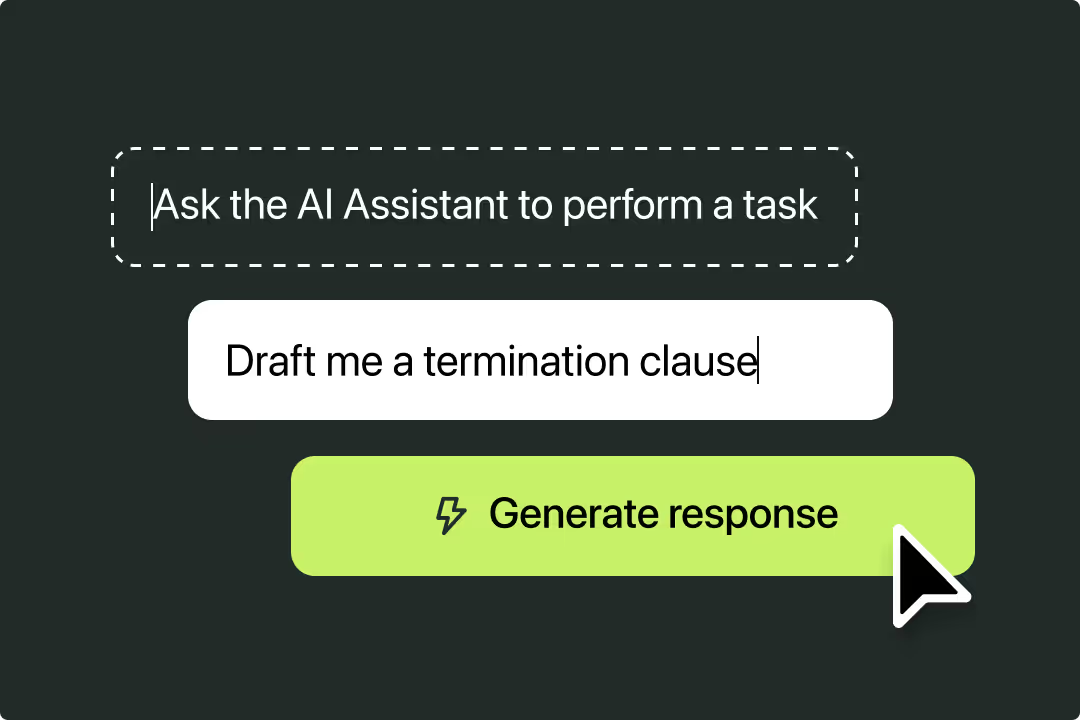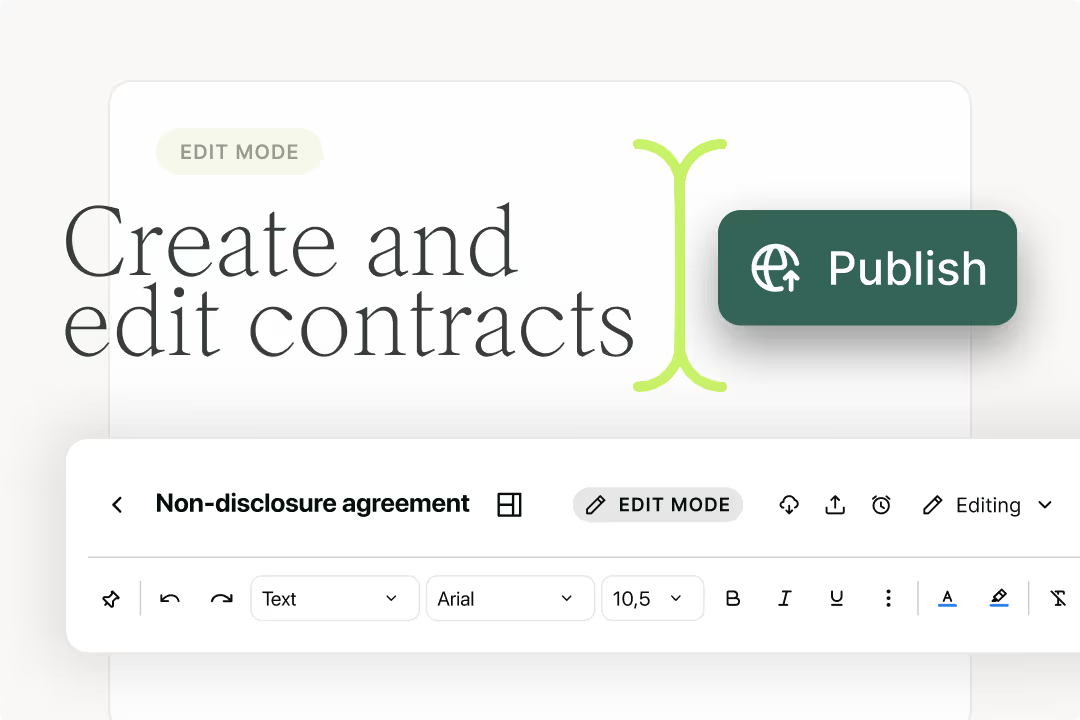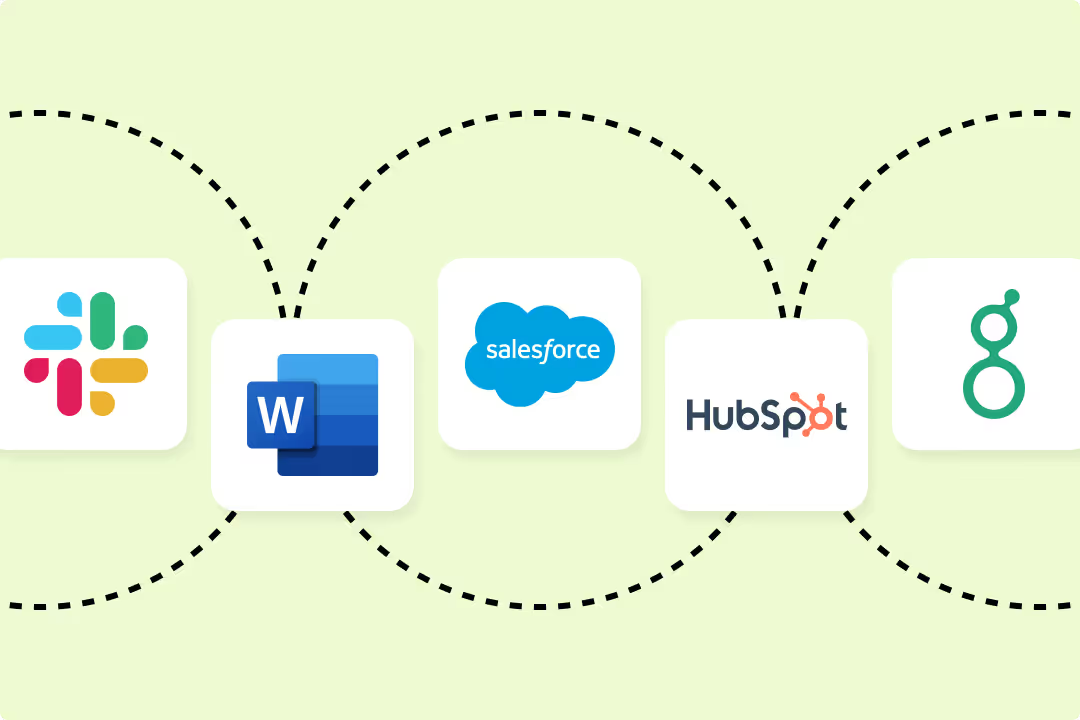Solutions
Customer Support
Resources
Contract creation describes the process used to either draft or generate legal agreements. It involves capturing the terms, conditions, rights, and obligations that each party agrees to abide by in a legally binding document.
The speed and efficiency of this process varies from business to business. For some, it's a fast and efficient cycle that enables teams to generate contracts on demand. For others, it's a waiting game, with different stakeholders blocking contracts and slowing growth as a result.
If you fall into the second category, don't stress. This guide will explore actionable steps you can take to speed up the contract creation process in 2026. But first, let's debrief on what a manual contract creation workflow looks like and why it can be painful.

How businesses approach contract creation will vary depending on the tools they use, how many contracts they manage, and who owns the process. However, a typical contract creation process looks a bit like this:
This stage involves identifying the need for a contract, whether it's for a new business relationship, a sales agreement, an employment contract, or any other purpose. This is usually done by reaching out personally to the legal team, or by submitting a contract request form.
Once the need for a contract is established, the stakeholders involved gather information and clarify their objectives, expectations, and any legal or regulatory requirements that need to be addressed in the contract. This is where commercial teams connect their opportunity to the contract, ensuring the terms agreed transfer seamlessly.
During this stage, the contract's terms and conditions are drafted based on the requirements and objectives identified in the previous step. This involves defining rights, obligations, responsibilities, payment terms, deliverables, and any other relevant provisions.
Contract terms are typically drafted by in-house legal teams, or by repurposing existing contract templates, depending on the legal function's size and capacity.
The contract draft will then be reviewed internally to make sure it is robust and aligned with business objectives. This is often the case when commercial teams draft the contract themselves since the legal team needs to make sure the terms adhere to certain guardrails and are compliant.
Not every contract will require a review, though. If you use an automated contract template, legal review can become faster or even redundant.
The necessary revisions and adjustments are then made based on the feedback received during the review process. This may involve incorporating changes, clarifications, and any additional terms agreed upon.
Contract creation isn't always smooth sailing. It can often be painful for legal and business teams, particularly if they're managing large contract volumes and don't have a repeatable process in place to create and manage them.
Common pain points include:
Fortunately, there are plenty of things businesses can do to create contracts faster, and more efficiently. Let's explore a few of these now.
One way to create contracts faster is to automate the drafting process using contract AI.
AI-enabled contract tools like Juro empower businesses to quickly generate contract terms that are consistent with their guardrails and playbooks.
This functionality eliminates the need for manual drafting and enables teams to revise and refine clauses in seconds, unlocking faster and more efficient contract workflows.

Another way to speed up the contract creation process is to set up robust contract templates for contracts you create often. These templates serve as starting points for routine contracts like SLAs, NDAs and vendor agreements, eliminating the need to start from scratch each time need a new contract.
Automated contract templates are particularly useful for this as they allow template owners to set rules and conditions in contracts. This means that clauses are automatically added, changed or removed when certain conditions are met.

Integrating your contract tools with other business systems can significantly reduce the time you spend creating contracts. Connecting your contract management platform with tools in your tech stack like Salesforce or HubSpot eliminates the need for manual data entry by automatically pulling relevant information from your CRM system into the contract template.
As a result, you can create contracts faster, reduce errors, and ensure accuracy in your agreements. You can also generate contracts in just a few clicks.

You can also streamline the contract creation process by implementing a comprehensive contract playbook that outlines best practices, guardrails, and approved processes for contract drafting and management.
By capturing this information in an accessible contract playbook, you enable commercial teams to self-serve confidently on contract creation, rather than waiting for legal teams to answer these queries on an ad hoc basis.
You can also reduce the time legal teams spend fixing errors and inconsistencies that legal teams during the review process by getting contract terms right first time.
Juro's AI-enabled contract management software enables businesses to do all of the above, and more. Juro users can generate watertight contracts in just a few clicks, either from their key business systems, or by filling out a simple Q&A form to populate the contract.
{{quote1}}
Not only does this automate routine contract admin for busy legal teams, but it also enables commercial teams to self-serve on routine contracts with confidence, meaning fewer delays and more time to focus on higher-value projects.
{{quote2}}
Best of all, Juro was built for legal and business teams, so you can empower individuals right across your organization to confidently create contracts that align with your playbooks.
To find out more about how Juro can transform the way you create and manage your contracts, fill in the form below to book a personalized demo.

Lorem ipsum dolor sit amet, consectetur adipiscing elit. Suspendisse varius enim in eros elementum tristique. Duis cursus, mi quis viverra ornare, eros dolor interdum nulla, ut commodo diam libero vitae erat. Aenean faucibus nibh et justo cursus id rutrum lorem imperdiet. Nunc ut sem vitae risus tristique posuere.

